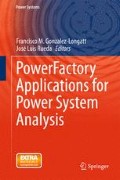Abstract
The development and application of heuristic optimization algorithms have gained a renewed interest due to the limitations of classical optimization tools for tackling several hard-to-solve problems in different engineering fields. Due to the complex nature of power system dynamics, electrical engineering optimization problems usually present a discontinuous multimodal and non-convex landscape that necessarily has to be handled by heuristic optimization algorithms. While most of the pioneer heuristic optimization approaches, such as genetic algorithms, particle swarm optimization, and differential evolution, are undergoing different types of modifications and extensions in order to improve their performance, great focus is also being put into the development of new approaches aiming at conceptual simplicity, easy adaptability for a variety of optimization-based applications, and outstanding performance. The mean–variance mapping optimization (MVMO) is a recent contribution to the family of evolutionary optimization algorithms. Its novel search mechanism performs within a normalized range of the search space for all optimization variables and follows a single parent–offspring pair approach. Besides, MVMO is characterized by a continuously updated knowledge archive storing the n-best solutions achieved so far, from which a special mapping function, which accounts for the mean and variance of the optimization variables, is applied for mutation operation. In this way, the algorithm proceeds by projecting randomly selected variables onto the corresponding mapping function that guides the solution toward the best set achieved so far. Despite the orientation on the best solution, the algorithm keeps on searching globally. This chapter addresses key aspects concerning the implementation of MVMO by using DIgSILENT programming language (DPL). An exemplary application on the coordinated tuning of power system supplementary damping controllers is presented and discussed in order to highlight the feasibility and effectiveness of structuring MVMO-based applications in DIgSILENT PowerFactory environment.
Access this chapter
Tax calculation will be finalised at checkout
Purchases are for personal use only
References
Cepeda JC, Rueda JL, Erlich I (2012) Identification of dynamic equivalents based on heuristic optimization for smart grid applications. In: Proceedings of the IEEE world congress on computational intelligence, pp 1–8
Chamba MS, Añó O (2013) Economic dispatch of energy and reserve in competitive markets using meta-heuristic algorithms. IEEE Latin Am Trans 11(1):473–478
Chiong R, Weise T, Michalewicz Z (eds) (2012) Variants of evolutionary algorithms for real-world applications. Springer, Berlin
DIgSILENT GmbH (2011) DIgSILENT PowerFactory Version 14.1 User’s Manual, Gomaringen, Germany, May 2011
Erlich I, Venayagamoorthy GK, Nakawiro W (2010) A mean-variance optimization algorithm. In: Proceedings of the IEEE congress on evolutionary computation, pp 1–6
Erlich I, Nakawiro W, Martinez M (2011) Optimal dispatch of reactive sources in wind farms. In: Proceedings of the IEEE PES general meeting, pp 1–7
Lee KY, El-Sharkawi MA (eds) (2008) Modern heuristic optimization techniques. Wiley, Hoboken
Machowski J, Bialek J, Bumby J (2008) Power system dynamics: stability and control. Wiley, West Sussex
Nakawiro W, Erlich I, Rueda JL (2011) A novel optimization algorithm for optimal reactive power dispatch: a comparative study. In: Proceedings of the 4th international conference on electric utility deregulation and restructuring and power technologies, pp 1555–1561
Pringles R, Rueda JL (2012) Optimal transmission expansion planning using mean-variance mapping optimization. In: Proceedings of the sixth IEEE/PES transmission and distribution: Latin America conference and exposition, pp 1–8
Rogers G (2000) Power system oscillations. Kluwer Academic Publishers, Boston
Rueda JL, Guamán WH, Cepeda JC, Erlich I, Vargas A (2013) Hybrid approach for power system operational planning with smart grid and small-signal stability enhancement considerations. IEEE Trans Smart Grid—Spec Issue Comput Intell Appl Smart Grids 4(1):530–539
Simon D (2013) Evolutionary optimization algorithms: biologically inspired and population-based approaches to computer intelligence. Wiley, Hoboken
Talbi EG (2009) Metaheuristics: from design to implementation. Wiley, Hoboken
Author information
Authors and Affiliations
Corresponding author
Editor information
Editors and Affiliations
12.1 Electronic Supplementary Material
Below is the link to the electronic supplementary material.
Rights and permissions
Copyright information
© 2014 Springer International Publishing Switzerland
About this chapter
Cite this chapter
Cepeda, J.C., Rueda, J.L., Erlich, I., Korai, A.W., Gonzalez-Longatt, F.M. (2014). Mean–Variance Mapping Optimization Algorithm for Power System Applications in DIgSILENT PowerFactory. In: Gonzalez-Longatt, F., Luis Rueda, J. (eds) PowerFactory Applications for Power System Analysis. Power Systems. Springer, Cham. https://doi.org/10.1007/978-3-319-12958-7_12
Download citation
DOI: https://doi.org/10.1007/978-3-319-12958-7_12
Published:
Publisher Name: Springer, Cham
Print ISBN: 978-3-319-12957-0
Online ISBN: 978-3-319-12958-7
eBook Packages: EnergyEnergy (R0)

